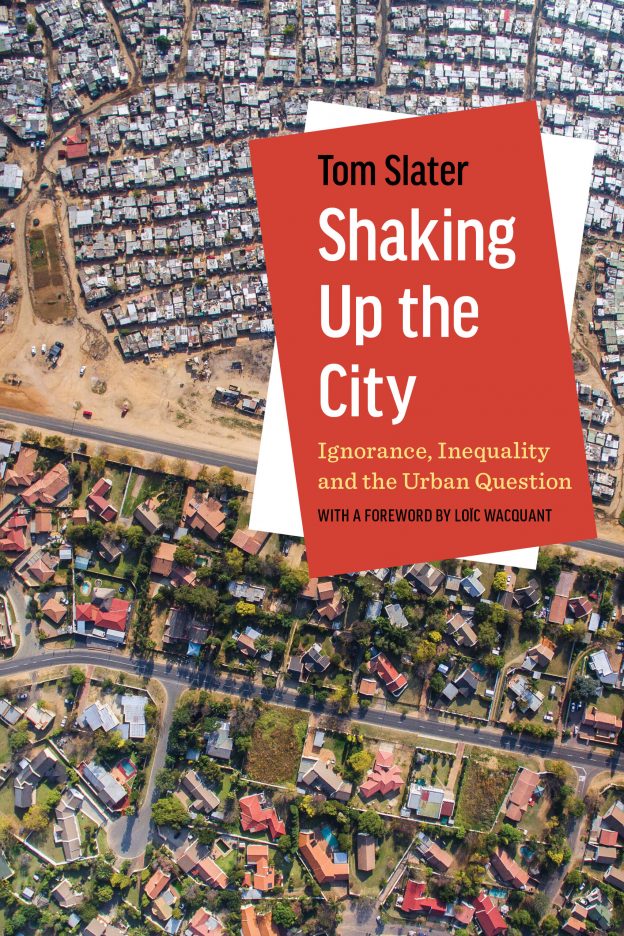In creative writing courses, students are encouraged to ‘show, don’t tell’. Focus on action, dialogue and description and minimize exposition. Exposition deadens the text and disrupts the story’s flow. For the social sciences, however, exposition matters. Not only do we want to know what happened, we also want to know why it happened and what it means. The social science scholar is obligated to show and to tell.
Shaking Up the City is a plea for a critical urban scholarship that attends to how knowledge is produced; one that resists political pressure from governments and the financial temptations of corporations and debunks the rhetoric of those who situate justice within the confines of individual freedom. According to Tom Slater (Professor of Urban Planning at Columbia University) the problem to be addressed constitutes a ‘striking deficit of critical intellectual reflection’ (p. 1), and he skillfully shows what a critical urban scholar does. Yet, when Slater attempts to tell us what qualities define a critical scholar, too many important questions are left unanswered.
Most of the book is devoted to assessing various instances in which scholarly concepts and policy rhetoric, either alone or together, hide reality from view and preclude a progressive response. Drawing on the secondary literature and illustrating his argument with numerous and often extended examples, Slater describes how the new field of urban science suppresses diversity and cloaks power; how the concept of resilience is deployed to hide the forces that make people vulnerable; how ‘gentrification’ sets up a false choice between prosperity and blight; how the notion of displacement has been constricted in order to sidestep the actual dynamics at play when people are forced from their homes and neighborhoods; how the concept of neighborhood effects inverts the extent to which one’s life chances (shaped by class, gender, sexuality and ethnicity) influence where one lives; and how descriptions of place (such as ‘sink estates’ in the UK) stigmatize both the place and the people who live there. And although Slater presents what a critical urban scholar does as mainly oppositional, he also points to how resilience might be salvaged, defends rent controls and rent gap theory, and notes how the ghetto, properly defined, can better distinguish among neighborhoods. Throughout the core chapters, he champions theoretical vision and conceptual clarity.
Slater’s critical perspective rests on the premise that concepts have consequences. Concepts are not politically neutral, but rather shape how and what we think and, in so doing, they block access to alternative perspectives—an understanding he takes from Pierre Bourdieu’s reflections on symbolic power and Loïc Wacquant’s writings on stigmatization and epistemic reflexivity. To this, Slater adds two other ideas meant to define a critical urban scholarship: one has to do with the intentional production of ignorance (termed agnotology by the historian of science, Robert Proctor), and the other with the difference between autonomy and heteronomy. In brief, critical urban scholarship means engaging in conceptual reflexivity, exposing the ignorance that blocks knowledge, and establishing autonomy from external influence.
Consider ignorance. Behind such concepts as ‘ghetto’ and ‘neighborhood effects’, Slater maintains, are powerful institutions manipulating the public and academic researchers so as to ensure that affluent and politically influential interests benefit to the detriment of people who are oppressed, exploited and marginalized. In effect, these institutions manufacture and distribute ignorance. In order to turn ignorance into common sense (his phrase), Slater directs the critical urban scholar to recognize the existence of symbolic power.
Yet, more should have been said here. How do critical scholars know when they are being manipulated? Is ignorance the same as misinformation, or ideological disagreement? What, actually, is the antidote for ignorance? Is it truth? If so, what does he mean by truth and how might we know it? Just as bothersome, Slater implicitly labels as ignorant almost all of those with whom he disagrees. The only scholars he exempts are those who belong to his scholarly community of left-leaning, anti-capitalist, pro-social justice urban scholars. Disagreements within the paradigm are fine; those who deny the paradigm are ignorant. As a critical perspective, this lacks subtlety.
What shields the critical scholar from ignorance, Slater claims, is the autonomy that is realized when people recognize their social obligations to others. Autonomy enables critical scholars to resist a pervasive heteronomy that constrains them from asking their own questions and applying their own concepts. Constructed by grant-driven universities, right-wing think tanks, corporate research contracts and the political strictures of policy research, heteronomy leads, in Slater’s phrasing, to vested-interest and false-choice urbanism. But can one really escape heteronomy? Can one be inoculated against it? Are not all scholarly communities heteronomous to a degree? How is it that critical urban scholarship is made collective and the critical scholar’s social obligations established? Also, is it not the case that critical urban scholarship is already collective and already value-driven? Slater is silent precisely when he needed to delve more deeply into the premises and implications of his advice. Addressing such questions would also have deflected any sense that critical urban scholarship is something done by heroic individuals pitting themselves against the gale-force winds of powerful interests.
Slater is a critical urban scholar and a good one, and in this book he shows us what critical urban scholarship looks like. He tells us too little, though, about how to do critical scholarship.
Robert Beauregard is a Professor of Urban Planning at Columbia University, and chair of the Doctoral Subcommittee on Urban Planning. More information can be found here. https://www.arch.columbia.edu/faculty/168-robert-beauregard
Tom Slater. Shaking Up the City: Ignorance, Inequality, and the Urban Question. Oakland, CA: University of California Press © 2021. Cover used with permission of University of California Press.
Views expressed in this section are independent and do not represent the opinion of the editors.

